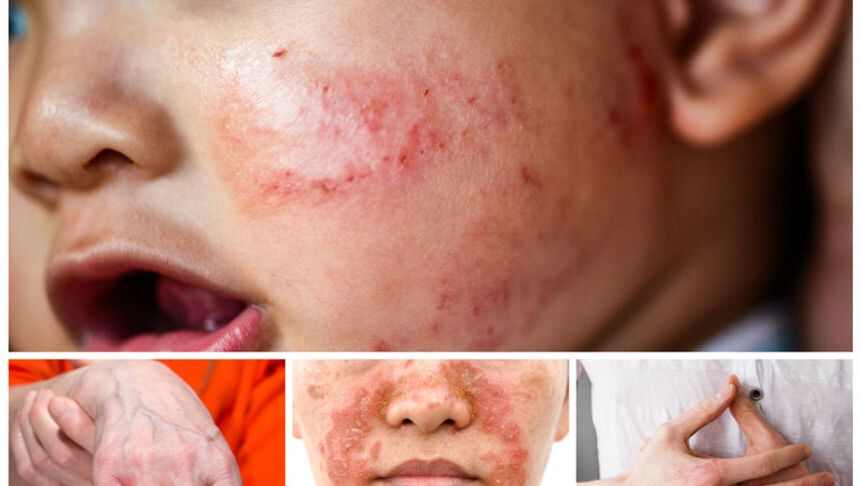Egzema na szyi - Przyczyny, Objawy i Skuteczne Metody Leczenia
Egzema na twarzy w przebiegu wyprysku łojotokowego
W przypadku wyprysku łojotokowego na twarzy możemy zaobserwować zmiany rumieniowe z towarzyszącym złuszczaniem, a czasami również wysiękiem. Co więcej, charakterystyczna jest obecność żółtych, czasami nawarstwionych strupów.
Wykwity zajmują typowo skórę dolnej części twarzy oraz skórę w okolicy brwi, czoła i fałdów nosowo-wargowych. Może być również zajęta owłosiona skóra głowy.
Zmianom skórnym może towarzyszyć świąd. Ponadto, przewlekły przebieg tego schorzenia może wiązać się z przerzedzeniem włosów i brwi.
Charakterystyczną cechą egzemy w przebiegu atopowego zapalenia skóry jest lichenizacja. Lichenizacja skóry objawia się zgrubieniem naskórka. Patrząc na skórę można mieć wrażenie, że ogląda się ją przez szkło powiększające.
Zmiany skórne o charakterze egzemy mogą występować również w obrębie owłosionej skóry głowy. Często zajęte są również małżowiny uszne. Przerzedzeniu mogą ulegać brwi, co jest szczególnie widoczne w ich części zewnętrznej. Objaw przerzedzenia brwi w przebiegu AZS nazywany jest objawem Hertogha.
Jak przeciwdziałać zapaleniu skóry?
Egzema na dłoniach czy innych częściach ciała to poważny problem – nie tylko estetyczny. Dlatego tak ważna jest profilaktyka, zwłaszcza jeśli wiemy, że mamy tendencję do pojawiania się tego typu zmian skórnych. Kluczową sprawą jest odpowiednia pielęgnacja skóry. Należy zadbać o higienę oraz właściwe nawilżenie i natłuszczenie. Warto sięgnąć po profesjonalne emolienty, umożliwiające delikatne mycie bez naruszania naturalnej bariery ochronnej. W przypadku wyprysku kontaktowego najważniejsze jest unikanie pokarmów lub substancji uczulających czy wywołujących podrażnienie skóry.
Swędzenie, pieczenie i mało estetyczne zmiany na skórze – egzema powodować może poważny dyskomfort fizyczny i psychiczny . Dbając na co dzień o odpowiednie nawilżenie i natłuszczenie skóry, a także unikając czynników alergizujących i drażniących, możemy skutecznie minimalizować ryzyko wystąpienia stanu zapalnego.
Niniejszy artykuł nie jest poradą medyczną i ma charakter wyłącznie informacyjny.
Rodzaje egzemy
W zależności od czynnika, który predysponuje do rozwoju choroby można wyróżnić dwa typy egzemy – egzemę endogenną oraz egzemę egzogenną. Na egzemę endogenną wpływ mają bodźce wewnętrzne, bez udziału środowiska zewnętrznego. Jest uwarunkowana genetycznie. Jeśli do powstania zmian na skórze przyczyniają się czynniki zewnętrzne, wtedy mówimy o egzemie egzogennej, inaczej kontaktowej. Występujące wówczas zmiany skórne ograniczone są do konkretnych obszarów ciała – mogą występować jako egzema na twarzy, egzema na dłoniach i stopach czy też podudziach.
Odmienny rodzaj egzemy może powodować dolegliwości o różnym charakterze. Najważniejsze z nich to:
- wyprysk kontaktowy (alergiczny) – egzema kontaktowa, nazywana jest również kontaktowym zapaleniem skóry. Zmiany chorobowe powstają w miejscu, gdzie doszło do kontaktu z substancjami alergicznymi. Może być wywołana przez różnego rodzaju czynniki chemiczne, takie jak chrom, nikiel lub kobalt, które znajdują się w wielu przedmiotach – kosmetykach, biżuterii i ubraniach. Typowymi lokalizacjami dla tego typu egzemy są dłonie i przedramiona,
- wyprysk atopowy – ten rodzaj egzemy uwarunkowany jest predyspozycją genetyczną, a czynnikami wywołującymi są alergeny pokarmowe (np.cytrusy, gluten, laktoza), jak również alergeny wziewne (np.pyłki traw). Predysponuje do powstania atopowego zapalenia skóry. Zmiany skórne najczęściej pojawiają się we wczesnym dzieciństwie i współistnieją z innymi schorzeniami o podłożu alergicznym (astmą, katarem siennym),
- wyprysk łojotokowy – z tym rodzajem egzemy mamy do czynienia wówczas, gdy w określonych miejscach dochodzi do nasilonej produkcji łoju. Należy do nich: owłosiona skóra głowy, okolice nosa, brwi, policzków, fałdów nosowo-wargowych, skóra za małżowinami usznymi, na plecach oraz między łopatkami. Oprócz typowych cech wyprysku łojotokowe zapalenie skóry cechuje się powstawaniem wysięku, który zasycha ma skórze pod postacią żółtych strupów.
Jakie mogą być postacie egzemy, czyli zapalenia skóry?
- Wyprysk atopowy, czyli Atopowe Zapalenie skóry (AZS, eczema atopica)
Osoby z atopowym zapaleniem skóry mają wrodzoną skłonność do alergii oraz nadmiernie suchej skóry, która nie stanowi wystarczającej bariery przed wnikaniem drażniących substancji ze środowiska. Ta postać zapalenia skóry najczęściej pojawia się u niemowląt, jednak większość chorych wyrasta z tej choroby około 12. roku życia. W przypadku AZS kluczowe znaczenie mają: karmienie piersią (radykalnie zmniejsza ryzyko pojawienia się wyprysku atopowego) oraz właściwa pielęgnacja skóry, czyli odpowiednie jej oczyszczania i nawilżanie.
Zobacz, jak wygląda wyprysk atopowy
- Kontaktowe zapalenie skóry spowodowane czynnikami drażniącymi
Ta postać egzemy charakteryzuje się obecnością rumienia, pęcherzyków i popękanej skóry. Czynnikami drażniącymi są zwykle detergenty, wybielacze, mydła. Osoby wrażliwe na te środki nie mogą pracować w niektórych zawodach, takich jak fryzjer, chemik.
Zobacz, jak wygląda zmiana związana w kontaktowych zapaleniem skóry
- Alergiczne kontaktowe zapalenie skóry
Ta postać egzemy wymaga uprzedniego uczulenia się na konkretny alergen. Przy czym nawet bardzo rozcieńczony alergen może wywołać silną i długo utrzymującą się zmianę skórną. Wśród często spotykanych alerganów, prowadzących do alergicznego kontaktowego zapalanie skóry można wymienić:

 U nas zapłacisz kartą
U nas zapłacisz kartą
